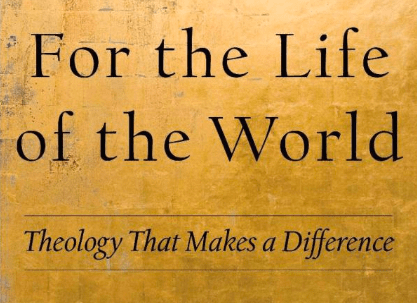 Miroslav Volf and Matthew Croasmun, in For the Life of the World, contend for the following major ideas when it comes to what theology is or what it ought to be doing today:
Miroslav Volf and Matthew Croasmun, in For the Life of the World, contend for the following major ideas when it comes to what theology is or what it ought to be doing today:
The heart of our proposal concerns the purpose of theology. It is to discern, articulate, and commend visions of and paths to flourishing life in light of the self-revelation of God in the life, death, resurrection, exaltation, and coming in glory of Jesus Christ, with this entire story, its lows and its highs, bearing witness to a truly flourishing life.
That is, theology is not just about ideas and writing and articulations and creeds. It’s about life, or ought to be about life itself. What they call the flourishing life.
They recognize that how one articulates the flourishing life is diverse in church history and in the Bible itself. They are not seeking the one language that says it all. But here is a bold and powerful claim:
The subject matter of theology will depend on the basic character of flourishing life.
Even more, the theologian’s burden is to embody — to get in on the embodying — of this flourishing life.
To argue that theology is a way of life seeking understanding is to raise the question of the relation between the way of life theologians live and the way of life they articulate and commend. … Or do the lives of theologians need to align, in some sense at least, with the way of life they seek to articulate? Might they even need to embody that way of life, to “speak the truth in the form of a manifestation of existence,” as Michel Foucault approvingly wrote of the Cynics in one of his last lectures?
Search for truth no longer requires the effort to live in the truth.
They know the history of theologians does not embrace the disconnect: Bernard of Clairvaux, Martin Luther, Gustavo Gutiérrez, Katie Geneva Cannon…
Our thesis is simple and controversial: execution of the central theological task requires a certain kind of affinity between the life the theologian seeks to articulate and the life the theologian seeks to lead.
In this chapter we will argue, first, that an affinity between theologians’ lives and the basic vision of the true life that they seek to articulate is a condition of the adequacy of their thought. Second, we will contend that the nature of that affinity is not strict correspondence between the theologian’s life and a Christian vision of the true life but rather striving for congruence between the two. Third, we will explore the nature of a cycle—virtuous and vicious—between reasoned theological articulations and theologians’ lives. We will conclude by identifying key intellectual virtues requisite for doing theological work well.
Affinity between thought and life is about credibility, and affinity requires some levels of transformation. “It requires a death of the self and its rising again and a resultant shift in seeing and hearing, a new set of eyes and ears as the organs of a new self.”
But theologians, like all humans, are pilgrims. It’s about affinity not what they call “homomorphy” (a kind of perfect alignment). It’s both proleptic (eschatological) and ecstatic (something from the outside).
Truth seeking is a constitutive dimension of living the true life; and living the true life—always proleptically and therefore aspirationally—is a condition of the search for its truthful articulation.
What are the “intellectual dispositions” or virtues for a theologian?
1. Love of Knowledge, God, and the World
2. Love of Interlocutors
3. Courage
4. Gratitude and Humility
5. Firmness—and a Soft Touch
6. Faithfulness
The theologian’s great burden, then, is to live faithfully the theology that theologian articulates.











